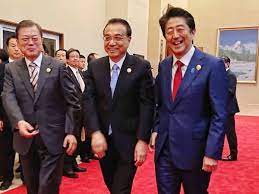Subscribe
Subscribe Now to receive Goldsea updates!
- Subscribe for updates on Goldsea: Asian American Supersite


A trilateral free-trade agreement among Japan, S. Korea and China would provide the smallest economic benefit to China, according to calculations by Deutsche Bank’s China economist Ma Jun.
If the talks planned for early next year lead ultimately to an FTA, it would boost S. Korea’s GDP by 2.9%, Japan’s by 1.4% and China’s by 0.8%, according to an estimate by Ma at an economic forum Sunday. Of course, Ma’s estimates are very rough, being based on a non-existent agreement whose ultimate scope is beyond accurate prediction.
If, on the other hand, current territorial tensions between China and Japan lead to an FTA that excludes Japan, S. Korea would still enjoy a 2.9% GDP boost while China would see a mere 0.08% benefit, according to Ma’s rough calculations. If left out, Japan would suffer a 0.3% contraction of its GDP.
Earlier reports had suggested that of the three nations, S. Korea is the least enthusiastic about a trilateral regional FTA because it has already implemented FTAs with the US and the European Union and is actively working on additional agreements with its major trading partners.
China, on the other hand, is eager to play a larger role in regional affairs as well as to enjoy greater market access to Japan and S. Korea. Beijing is also motivated by its perception that the US is seeking to isolate it by pushing the Trans-Pacific Partnership, a pan-Pacific Rim trading block that, so far, has made no move to include China.
China would prefer to see a trilateral FTA evolve into an eventual Regional Comprehensive Economic Partnership among the 10-member ASEAN plus six other nations, including China, Japan and South Korea. The partnership aims to lower tariffs and other non-tariff trade barriers across the region by the end of 2015. A trilateral FTA would help accelerate the grueling negotiations process though China, Japan and S. Korea already have separate bilateral trade agreements with ASEAN.
A trilateral FTA would be a net loss for China’s industrial sector, according to Ma’s analysis. On the other hand, its service, garment and transport sectors would stand to gain, especially in seaboard provinces like Liaoning, Heibei, Jiangsu, and the port city of Tianjin.
